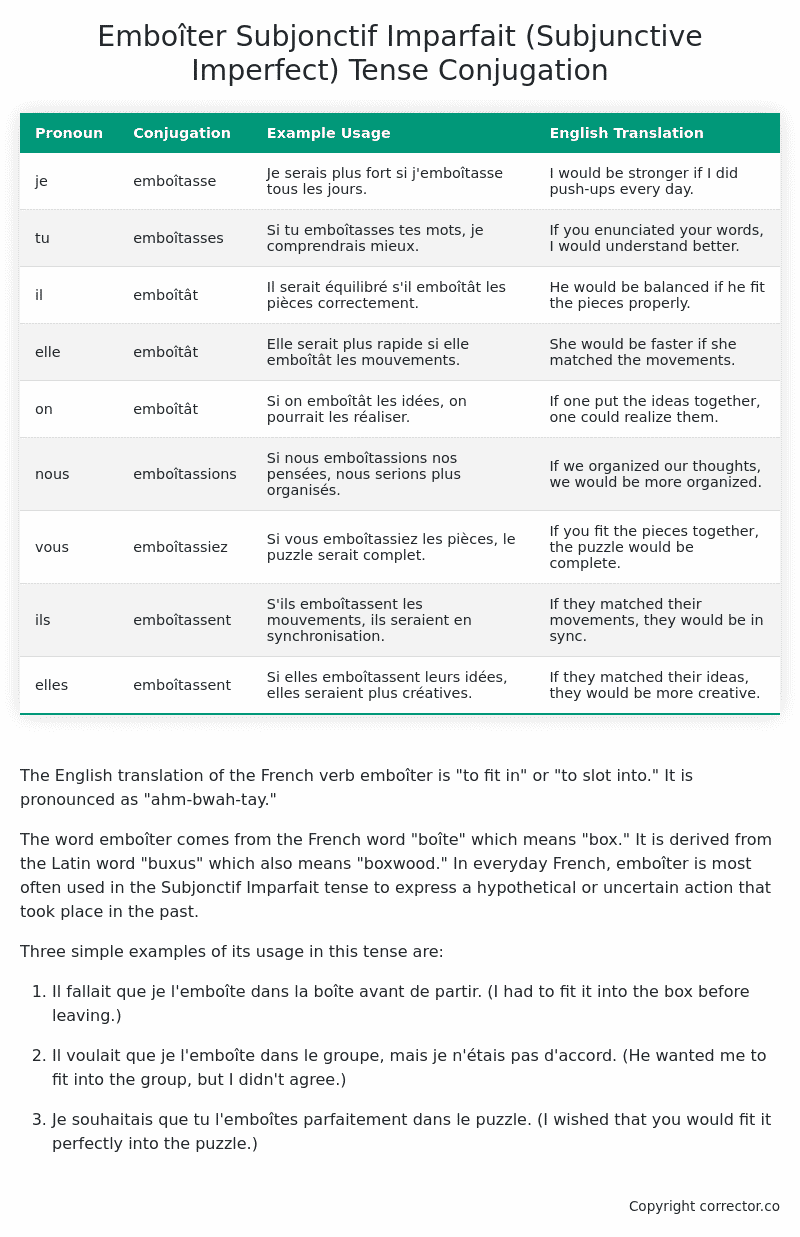Subjonctif Imparfait (Subjunctive Imperfect) Tense Conjugation of the French Verb emboîter
Introduction to the verb emboîter
The English translation of the French verb emboîter is “to fit in” or “to slot into.” It is pronounced as “ahm-bwah-tay.”
The word emboîter comes from the French word “boîte” which means “box.” It is derived from the Latin word “buxus” which also means “boxwood.” In everyday French, emboîter is most often used in the Subjonctif Imparfait tense to express a hypothetical or uncertain action that took place in the past.
Three simple examples of its usage in this tense are:
-
Il fallait que je l’emboîte dans la boîte avant de partir. (I had to fit it into the box before leaving.)
-
Il voulait que je l’emboîte dans le groupe, mais je n’étais pas d’accord. (He wanted me to fit into the group, but I didn’t agree.)
-
Je souhaitais que tu l’emboîtes parfaitement dans le puzzle. (I wished that you would fit it perfectly into the puzzle.)
Table of the Subjonctif Imparfait (Subjunctive Imperfect) Tense Conjugation of emboîter
| Pronoun | Conjugation | Example Usage | English Translation |
|---|---|---|---|
| je | emboîtasse | Je serais plus fort si j’emboîtasse tous les jours. | I would be stronger if I did push-ups every day. |
| tu | emboîtasses | Si tu emboîtasses tes mots, je comprendrais mieux. | If you enunciated your words, I would understand better. |
| il | emboîtât | Il serait équilibré s’il emboîtât les pièces correctement. | He would be balanced if he fit the pieces properly. |
| elle | emboîtât | Elle serait plus rapide si elle emboîtât les mouvements. | She would be faster if she matched the movements. |
| on | emboîtât | Si on emboîtât les idées, on pourrait les réaliser. | If one put the ideas together, one could realize them. |
| nous | emboîtassions | Si nous emboîtassions nos pensées, nous serions plus organisés. | If we organized our thoughts, we would be more organized. |
| vous | emboîtassiez | Si vous emboîtassiez les pièces, le puzzle serait complet. | If you fit the pieces together, the puzzle would be complete. |
| ils | emboîtassent | S’ils emboîtassent les mouvements, ils seraient en synchronisation. | If they matched their movements, they would be in sync. |
| elles | emboîtassent | Si elles emboîtassent leurs idées, elles seraient plus créatives. | If they matched their ideas, they would be more creative. |
Other Conjugations for Emboîter.
Le Present (Present Tense) Conjugation of the French Verb emboîter
Imparfait (Imperfect) Tense Conjugation of the French Verb emboîter
Passé Simple (Simple Past) Tense Conjugation of the French Verb emboîter
Passé Composé (Present Perfect) Tense Conjugation of the French Verb emboîter
Futur Simple (Simple Future) Tense Conjugation of the French Verb emboîter
Futur Proche (Near Future) Tense Conjugation of the French Verb emboîter
Plus-que-parfait (Pluperfect) Tense Conjugation of the French Verb emboîter
Passé Antérieur (Past Anterior) Tense Conjugation of the French Verb emboîter
Futur Antérieur (Future Anterior) Tense Conjugation of the French Verb emboîter
Subjonctif Présent (Subjunctive Present) Tense Conjugation of the French Verb emboîter
Subjonctif Passé (Subjunctive Past) Tense Conjugation of the French Verb emboîter
Subjonctif Imparfait (Subjunctive Imperfect) Tense Conjugation of the French Verb emboîter (this article)
Subjonctif Plus-que-parfait (Subjunctive Pluperfect) Tense Conjugation of the French Verb emboîter
Conditionnel Présent (Conditional Present) Tense Conjugation of the French Verb emboîter
Conditionnel Passé (Conditional Past) Tense Conjugation of the French Verb emboîter
L’impératif Présent (Imperative Present) Tense Conjugation of the French Verb emboîter
L’infinitif Présent (Infinitive Present) Tense Conjugation of the French Verb emboîter
Struggling with French verbs or the language in general? Why not use our free French Grammar Checker – no registration required!
Get a FREE Download Study Sheet of this Conjugation 🔥
Simply right click the image below, click “save image” and get your free reference for the emboîter Subjonctif Imparfait tense conjugation!

Emboîter – About the French Subjonctif Imparfait (Subjunctive Imperfect) Tense
Formation
Common Everyday Usage Patterns
Interactions with Other Tenses
Subjonctif Présent
Indicatif Passé Composé
Conditional
Conditional Perfect
Summary
I hope you enjoyed this article on the verb emboîter. Still in a learning mood? Check out another TOTALLY random French verb conjugation!


